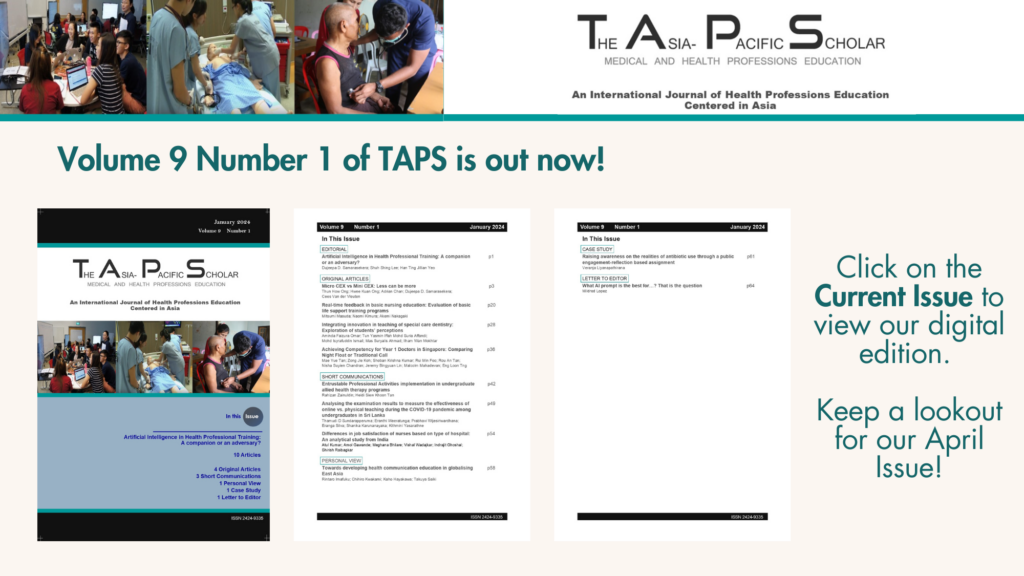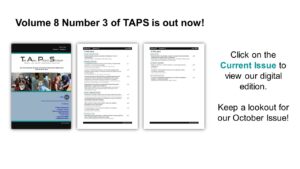Student’s motivation to pursue a graduate-entry medicine degree programme
Submitted: 1 April 2020
Accepted: 26 May 2020
Published online: 5 January, TAPS 2021, 6(1), 128-131
https://doi.org/10.29060/TAPS.2021-6-1/PV2240
Sonia Kumar, Rachel Browne, Jeffrey Wu & Simon Tso
Department of Dermatology, South Warwickshire NHS Foundation Trust, Warwick, United Kingdom
I. FACTORS INFLUENCING MOTIVATION TO PURSUE GRADUATE-ENTRY MEDICINE
The decision to pursue medicine is a significant step for individuals, particularly those for whom this involves a career change. While medicine in the UK has traditionally been an undergraduate course, graduate-entry medicine (GEM) programmes were introduced in 2000 and offer an accelerated course for suitably qualified candidates with a Bachelor’s degree. Students have a variety of motivations for undertaking a GEM programme (Carter & Peile, 2007), and we herein explore the factors that influence this range of motivations.
Literature suggests that students of GEM programmes can broadly be categorised into two groups: individuals who do not consider medicine when choosing their first degree, or individuals who selected a degree subject that would keep medicine open as a career (Sulong et al., 2014). Key motivating factors to pursue GEM include prior health service experience (as a patient or as a health professional), professional autonomy, and influence from others. The most frequently cited factor influencing the decision was a desire to help people (Sulong et al., 2014). Other literature suggests a lack of job satisfaction and limited career development opportunities are key factors drawing individuals away from their original career paths and into medicine.
The other group includes individuals who had previously failed to gain entry to medical school at the undergraduate level, studying alternative subjects but maintaining a goal of studying medicine. These individuals have demonstrated motivation by completing a degree that was not their first choice, and this can continue throughout their medical studies. A comparison of Leicester Medical School GEM and undergraduate-entry medicine (UEM) students found higher general pass rates for GEM students with a biomedical science background when compared to their UEM peers (Carter & Peile, 2007).
II. STUDENT EXPERIENCES
A semi-structured interview-based study exploring the experiences of twenty-one students from the University of Warwick GEM programme was conducted by the author Simon Tso as part of his doctoral research thesis (Tso, 2017). Students were asked to describe their motivations to pursue GEM. Three broad groups of student journeys into GEM were identified: ‘medicine as an end goal’, ‘career indecision’ and ‘career switchers’. The ‘medicine as an end goal’ group represented students within the study and students in this group recalled a longstanding ambition to pursue medicine. The ‘career indecision’ group consisted of students who had previously considered medicine as a potential career but instead chose an alternative path. The ‘career switchers’ comprised of students who left their previous career to pursue GEM.
A. Why Pursue Medicine as a Career?
Motivations to pursue GEM were attributed to a combination of ‘pull’ and ‘push’ factors. ‘Pull’ factors included those that the students regarded as positive experiences or perceived incentives of choosing medicine as a career. A few, however, experienced negative ‘pull’ factors, recalling pressure and expectation from family to pursue medicine simply because they were good at science. Often, the reassurance of a guaranteed job following the degree influenced this pressure.
A key theme for motivations reported by this group was their general interest in human health, a desire to improve people’s lives and to do “meaningful work”. In most instances, many had received positive encouragements from other individuals who supported and positively influenced their career choice. One student, however, recalled a negative experience in secondary school when he expressed an interest in applying for UEM to a teacher. This teacher subsequently discouraged application expressing that they did not believe the student would meet the expected entry requirements. The student felt that extra support from their teachers rather than discouragement could have guided them to have studied UEM rather than having to apply for a GEM programme later in life.
‘Push’ factors were reasons why some students chose to cease continuing on their original career path and consider alternative careers instead. Reasons given highlighted the disillusionment they felt with certain aspects of their original career path and therefore felt pushed to consider an alternative career. These included lack of career progression opportunities, lack of job satisfaction and lack of autonomy in their roles. The students perceived that medicine could offer the opportunities they desired from a career.
III. OUR REFLECTIONS
A. What Factors Influence Motivation to Study GEM?
The Self Determination Theory devised by Ryan and Deci (2000) can be applied to the understanding of why people choose to study GEM. The Self Determination Theory suggests that three factors are required for psychological growth: autonomy, competence and connection. Although thought to be innate, these factors are affected by environmental interactions and can influence our proactivity or passivity. The degree of self-determination is also influenced by whether the factors that motivate us are:
- Intrinsic–where an activity is done for the pleasure or enjoyment of the activity itself.
- Extrinsic–where a task is performed for a possible reward or fear of punishment.
- In some instances, factors that make us demotivated–the lack of desire to act or, act without intent.
Typical intrinsic factors recalled as motivations for pursuing GEM were the desire to do something fulfilling or to help others. For others it was the desire to commit to lifelong learning or a career where their interest in biological sciences could be applied to human physiology.
Extrinsic factors such as family pressures or socioeconomic background also have been known to impact career choice and journey. In some cultures, professions such as medicine, engineering or pharmacy are held in high esteem and children from these backgrounds can be encouraged to pursue these subjects at university. These careers are often associated with job and financial stability, factors that may be of high importance to individuals from a disadvantaged or low socioeconomic background. In these instances, a career in medicine can be perceived as a mode of upwards social mobility.
B. What Factors Contribute to Career Indecision?
Gati, Krausz and Osipow (1996) describe a theoretically driven taxonomy of career decision that can be applied to the career indecisions reported by the medical students in their study. The taxonomy was categorised into three broad clusters; lack of readiness, lack of information, and inconsistent information, all of which can explain why individuals may be hesitant or indecisive when considering a career in medicine.
Typically, students in the United Kingdom consider a career in medicine aged 16-18, applying to medical school in the second year of the A-Level programme. The decision to pursue medicine is difficult, and some may be lacking the required information to adequately prepare them, both to apply and to succeed in the application process. This is particularly relevant to students from disadvantaged backgrounds or resource-poor schools that may find it challenging to support the aspirations of their students and prepare them for medical school interviews.
Widening participation (WP) is an umbrella term referring to coordinated efforts that encourage and support individuals from underrepresented or disadvantaged backgrounds to consider pursuing academic careers such as engineering, medicine and law. The idea behind the programmes is to ensure that all students have access to equal opportunities, regardless of their background. These schemes often provide interview support, work experience schemes and checking of personal statements. They can provide further insight into the career, and also provide workshops on the special entrance tests required for medical school admission.
A medical student in our study was supported by a WP scheme to gain admission into her first degree which served as a stepping-stone into a GEM programme. An increase in provision and access to WP schemes would seek to level the playing field in the application process to medical school at both UEM and GEM level. The provision of extra support and information would enable these students to make informed career choices and make the medical school application process fairer.
IV. CONCLUSION
GEM programmes provide individuals the opportunity to pursue medicine as a career at a later stage, and their additional life and work experience can engender a more diverse and experienced cohort of graduates (Carter & Peile, 2007). WP schemes at the university level could further contribute to this diversity, and it would be interesting for future studies to explore whether students who were unsuccessful or did not attempt to gain entry at the UEM level could have benefited from secondary school WP programmes.
It is clear that there are multiple reasons individuals decide to pursue GEM, whether as a long-term ambition from school age or as a career change. These multifactorial motivations consist of both intrinsic and extrinsic factors and more work is needed to understand their influence on students’ motivations. Identifying common themes allows for more effective recruitment and teaching of these non-traditional students who will eventually contribute to a more diverse medical workforce.
Notes on Contributors
Dr Sonia Kumar is a graduate of the University of Warwick graduate-entry medicine degree programme and is a newly qualified Foundation Year 1 doctor at the South Warwickshire NHS Foundation Trust. Dr Kumar made substantial contributions to the conception, design, editing of this piece and approval of the final manuscript.
Dr Rachel Browne completed a Masters in Medical Education at the University of Warwick. She is a Speciality Registrar in Dermatology and former Clinical Education Fellow at the South Warwickshire NHS Foundation Trust. Dr Browne contributed to the design and editing of this piece including approving this final manuscript.
Dr Jeffrey Wu is a graduate of the University of Warwick graduate-entry medicine programme and former undergraduate Teaching Assistant at the University of California, San Diego. He is training in Internal Medicine at South Warwickshire NHS Foundation Trust. Dr Wu contributed to the design, edit and approval of this manuscript.
Dr Simon Tso completed a doctoral (MD) degree at the University of Warwick. He is a Fellow of the Higher Education Academy and Consultant Dermatologist at the South Warwickshire NHS Foundation Trust. Dr Tso made substantial contribution to the conception, data analysis/interpretation editing and authorising the final manuscript.
Ethical Approval
This study was part of a larger study investigating the experience of graduate-entry medicine degree programme students, which has received ethical approval from the University of Warwick Biomedical Research Ethics Sub-Committee (Reference: 169-01-2012).
Acknowledgements
The authors would like to thank Asim Yousuf, Nina Owen, Mike Smith and Dr Jane Kidd for their assistance with the design and development of the study.
Funding
This study was part of a larger study investigating the experience of graduate-entry medicine degree programme students, which was funded by the Institute for Advanced Teaching and Learning, University of Warwick, United Kingdom.
Declaration of Interest
The authors have no conflict of interest, including no financial, consultant, institutional and other relationships that might lead to bias.
References
Carter, Y. H., & Peile, E. (2007). Graduate entry medicine: High aspirations at birth. Clinical Medicine, 7(2), 143–147. https://doi.org/10.7861/clinmedicine.7-2-143
Gati, I., Krausz, M., & Osipow, S. H. (1996). A taxonomy of difficulties in career decision making. Journal of Counselling Psychology, 43(4), 510–526. https://doi.org/10.1037/0022-0167.43.4.510
Ryan, R. M., & Deci, E. L. (2000). Self-determination theory and the facilitation of intrinsic motivation, social development, and well-being. American Psychologist, 55(1), 68–78. https://doi.org/10.1037/0003-066X.55.1.68
Sulong, S., McGrath, D., Finucane, P., Horgan, M., O’Flynn, S., & O’Tuathaigh, C. (2014). Studying medicine – A cross-sectional questionnaire-based analysis of the motivational factors which influence graduate and undergraduate entrants in Ireland. JRSM Open, 5(4), 204253331351015. https://doi.org/10.1177/2042533313510157
Tso, S. H. Y. (2017). The graduate-entry medical student: Challenges to transition through medical school (Doctoral dissertation, University of Warwick, Coventry, United Kingdom). Retrieved from http://wrap.warwick.ac.uk/99890/
*Sonia Kumar
Lakin Road, CV34 5BW
South Warwickshire NHS Foundation Trust,
Warwick, United Kingdom
Email: Sonia.kumar@doctors.org.uk











